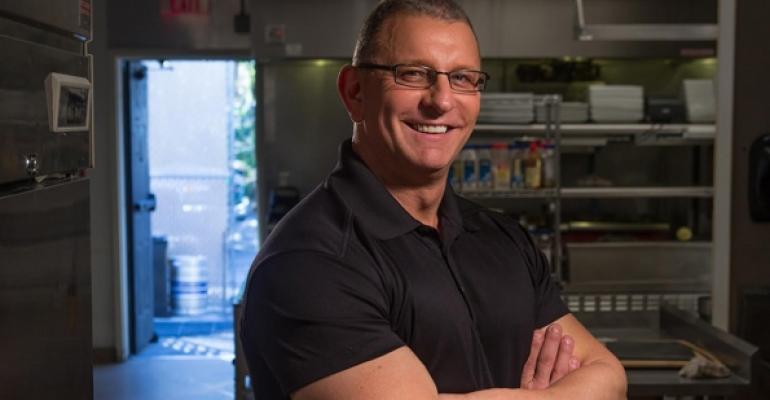Robert Irvine, host of the Food Network’s popular “Restaurant: Impossible” and new “Restaurant Express” shows, says foodservice success is about the business first.
“People think that in the real world it’s all about food. Actually, it’s not,” the British chef said. “The food has to be superb, yes, and you have to be able to cook. But what about all the business pieces that are in there? You have to be very business-savvy.”
Irvine, who spoke with Nation’s Restaurant News as part of a media tour with Easy Ice, the subscription-based ice-making equipment company, discussed other issues facing restaurant operators:
RELATED
• 5 restaurant execs reveal their top 3 strategic moves
• 8 challenges facing restaurant operators in 2014
• More restaurant operations news
What are some glaring mistakes people make in starting or operating restaurants?
Everyone thinks that because they can cook well at home, they should be in the restaurant business. That’s mistake No. 1.
And beyond that?
They also go into under-capitalized. They don’t have a correct business plan. That includes staffing, food, labor. Then it opens: It looks pretty; it smells new; and we do really well for the first year, if that long, then all of a sudden the bottom drops out of it and we wonder why. The trouble is, we’ve already spent the money and we haven’t had the foresight to put a percentage of that money away for a rainy day, such as a quiet day, equipment breaks down, new paint, new carpet, new tile — whatever the restaurant needs to keep its luster, to make it look pretty so people will still come in.
What other aspects should an operator consider?
Then you have to think about: Do we have a chef who can cook the food and put the food out in a timely manner and consistently? And do we have the servers who can serve it, smile and give great service? Is the menu affordable for people to come in?
What are the traits of a savvy operator?
They know everything that’s going on in their business. They are almost like a Type-A personality. They look. They check. They lead. They give direction. They follow through. And they are very smart about the way they spend their money.
Where should you spend?
You can buy everything new, or you can lease products. Then there are also subscriptions. Leases and subscriptions are very different. … My primary focus is safety and giving the guests the experience they came to the restaurant for. I don’t want to be cleaning my ice machine for three hours, when I should be coming up with specials and serving the food.
Has the recession brought about new challenges for restaurant operators?
If you produce a superior product that is in a reasonable price range and you give great service, people are going to come to your restaurant no matter what kind of economic times are there. We’ve proved that. Are people eating out as much as they used to? No. But they are coming back. The biggest problem is restaurants don’t keep up: They don’t clean; they don’t take care of their cutlery, crockery, table linens and chairs — the basic things when you walk into the restaurant — and they don’t hold the staff accountable. There’s a lack of leadership.
What’s the worst thing you’ve seen?
Cockroaches in the ice cubes. It was amazing to me.
What do you see on the horizon? What should restaurateurs keep their eye on?
I think small plates — tapas — are already big. I don’t think we like to eat big meals. We like to share. You put a couple of plates down, and you pick at each other’s food. I think that style of food will continue to grow. There will be healthier: less big sauces; less sugar and salts; and there will be more use of fresh juices and fresh herbs.
And in other parts of restaurant operations?
Technology is really changing the face of restaurants, hotels, motels and bars. We’ve started using a tablet computer with consumer response questions. If there’s a negative, it pops up on my phone so we can address your issues immediately. … Technology is changing the way we do business from inventory control to staff management.
How do you apply your military background in the British Royal Navy to the restaurant business?
You start with the end in mind: What is the goal? If the goal is to take Hamburger Hill, I work backward to decide what are the steps I need to be able to get from point A to take Hamburger Hill. The military teaches you to take strategic planning well. And chefs are very good at it if they’ve been to school and worked with other chefs. They understand the process from the school of hard knocks.
Contact Ron Ruggless at [email protected].
Follow him on Twitter: @RonRuggless





